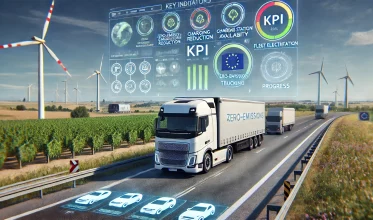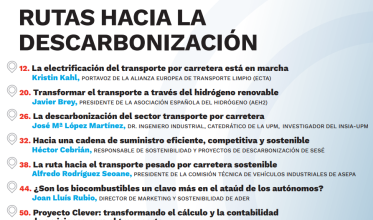EXECUTIVE SUMMARY
The use of electric trucks in urban and regional logistics has great potential to cut emissions in the freight sector and accelerate the decarbonisation of transport. With current advances in technology, logistics companies can electrify their fleets today. This report studies how logistics operators can charge electric trucks most cost-effectively at the depot, while also capturing consumer and grid benefits by optimising their charging processes. The authors provide new insights by analysing the costs of charging an electric truck fleet, based on an estimation of their energy requirements. To identify strategies for smart truck charging, the study models charging scenarios assuming a fleet of 10 electric trucks charging at logistics depots in Germany. While the grid data is illustrative, it is based on real vehicle and charging data from logistics operators using electric trucks in operations today.
The study finds that logistics companies who want to electrify their fleets will benefit from understanding how to optimise charging. An operator of a 10-truck electric fleet can achieve considerable savings—up to 15,000 euros annually, or about 10%-15% of total energy costs, including charging—by designing optimal charging scenarios based on estimates of the combined costs for charging and grid use. To avoid the significant costs that result from unmanaged or suboptimal charging, depots will need to identify optimisation strategies now, while they have few electric vehicles in their fleets or are planning their purchase. To do so, it is important for operators to analyse what drives charging costs, beyond the electricity consumption of the depots and fleets.
A central finding of this study regarding charging costs is that cheaper electricity prices are not necessarily a solid basis for optimising charging. EV charging for depots is comprised of the electricity cost and network cost. Electricity cost is based on prices at the wholesale market, while network cost reflects the cost for delivery of electricity to the depot. Our study finds that network fees, which in most European countries currently are not reflective of actual capacity on the grid, pose the biggest challenge to charging electric heavy-duty vehicles at depots. If the operator decides to raise capacity (i.e., 43 kW versus 22 kW) to charge with cheaper energy, there is a risk that this action may cancel out any savings because it incurs higher network costs. Network costs in most countries are designed based on peak capacity, that is, the depot’s highest consumption measured over a year. They are not designed to reflect when capacity is available on the grid. As a result of high network fees that are not aligned with grid benefits, it is currently more cost-effective for fleets to charge at night and look for optimal charging windows during the day. If network charges were to be reformed, as we recommend, the most cost-effective time to charge may change.
Optimisation strategies for transport operators are likely to change with fleet size. Our additional estimates for an electric fleet of trucks imply that it may be relatively easy to optimise smaller electric trucks fleet around the depot’s consumption. The larger the electric truck fleet, the more important it is to seek comprehensive load management solutions to optimise the fleet’s electricity consumption.
Policymakers can support logistics operators in the electrification of their fleets by reforming network charges and moving to time-varying tariffs. Member States can accelerate this process by setting ambitions high when implementing recent electricity market reforms.
Heavy-duty vehicle electrification is evolving rapidly, and this study provides initial strategies and uses cases that prepare the groundwork for further change. As with passenger electric vehicles (EVs), heavy-duty vehicles need more infrastructure, beyond depots, at freight centres and along highways. The European legislative framework for EV charging under review, the Alternative Fuels Infrastructure Directive, should therefore support the rapid build-out of additional charging options along roads and at destinations.
For further information, visit the International Council on Clean Transformation and the Regulatory Assistance Project”.





